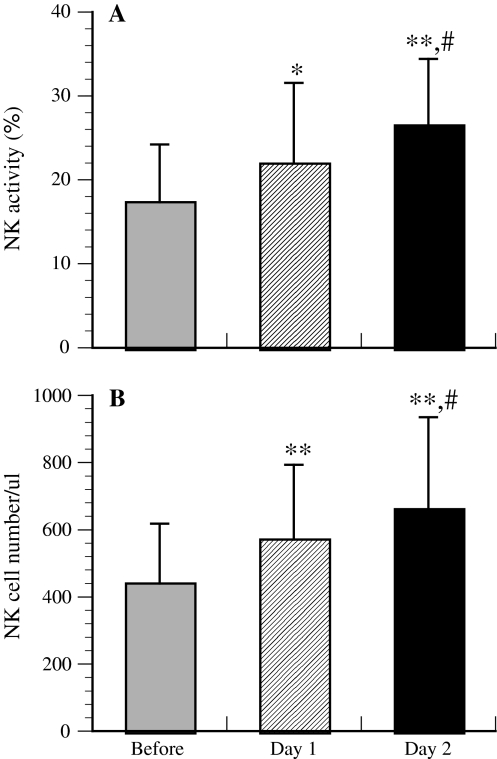Forest bathing in Japan found to boost immune system, study shows

A visit to the forest may do more than calm the mind. It could strengthen the body’s immune system.
A Japanese study has found that “Shinrinyoku”, or forest bathing, helps improve natural killer (NK) cell activity, special white blood cells that help fight infections and even cancer.
Researchers in Japan conducted a series of studies starting in 2005, involving adult men and women who took part in 3-day, 2-night forest bathing trips.
Blood and urine samples were taken before and after the trips to measure immune function.
The results from the research, titled Effect of forest bathing trips on human immune function and published in Environmental Health and Preventive Medicine (EHPM), the official journal of the Japanese Society for Hygiene, in 2010 showed that participants had significantly higher NK cell activity and more immune cells that produce protective proteins such as granulysin, perforin, and granzymes after spending time in the forest.
Levels of stress hormones, such as adrenaline, were lower compared to their normal working days.
Even more impressive, the boost in immune activity lasted for more than 30 days after the trip.
This means that taking a forest bath once a month could help people maintain a stronger immune system.
In contrast, participants who visited city areas did not show any improvement in immune function.

The findings suggest that spending quiet time in natural forest environments may serve as a simple, natural way to reduce stress and support better health.
Japan’s natural way to boost health and happiness
For centuries, people have found peace and comfort in the quiet and beauty of forests. In Japan, this connection with nature has become a popular health practice known as “Shinrinyoku”, or forest bathing.
Forest bathing is not about exercise or swimming; it’s about taking a slow, relaxing walk in the forest, breathing deeply, and enjoying the fresh air, the sounds of nature, and the green scenery.
The air in forests contains natural plant oils called phytoncides, which are released by trees like pine and cedar. These oils have been found to reduce stress and help the body fight germs.
The idea of forest bathing was introduced in 1982 by Japan’s Forest Agency as a way to improve people’s mental and physical health. Today, it is widely accepted in Japan as a form of natural therapy and stress management.
Studies show that forest bathing increases energy and reduces feelings of anxiety, depression, and anger. People who regularly spend time in forests are also less likely to develop stress-related illnesses.
With forests covering about 67% of Japan’s land, it’s no surprise that the practice is very popular. A national survey in 2003 found that one in four Japanese people had already tried forest bathing.
Experts say that the benefits of forest bathing are not limited to Japan; similar effects can be enjoyed anywhere in the world where people can connect with nature, breathe fresh air, and take time to relax among trees.
How forest air can help the body fight diseases
Researchers in Japan have discovered that breathing in the natural oils released by trees, known as phytoncides, can help strengthen the body’s immune system.
These plant-based oils are found in the air of forest environments and come from trees like Japanese cedar (Sugi) and Chamaecyparis obtusa.
Scientists studied how these oils affect the body’s natural killer (NK) cells, which play a key role in fighting viruses, infections, and even cancer cells.
In laboratory tests, NK cells were exposed to phytoncides such as fresh pine smell, sweet citrus smell, and minty or eucalyptus-like scent. The results showed that these natural compounds made NK cells more active and increased their ability to destroy harmful cells. This means that forest air can help boost the body’s natural defence system.
The study also found that these tree oils could repair and protect immune cells that were damaged by harmful chemicals like pesticides. In simple terms, the air from forests doesn’t just make people feel relaxed; it may also help their bodies fight diseases more effectively.
Other scientists have made similar findings. For example, research has shown that citrus fragrances from forests can lower stress hormones and improve immune response. Oils from plants such as Zanthoxylum rhoifolium and Pinus mugo have also shown anti-tumour and antioxidant effects.
Together, these discoveries suggest that spending time in forests — a practice known in Japan as “Shinrinyoku” or forest bathing — does more than refresh the mind. It may also strengthen the immune system, helping people stay healthier and more resistant to diseases.
DISCLAIMER: The Views, Comments, Opinions, Contributions and Statements made by Readers and Contributors on this platform do not necessarily represent the views or policy of Multimedia Group Limited.
DISCLAIMER: The Views, Comments, Opinions, Contributions and Statements made by Readers and Contributors on this platform do not necessarily represent the views or policy of Multimedia Group Limited.
Source link





